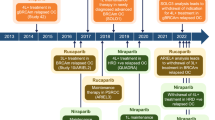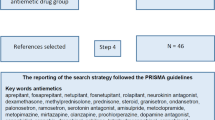Summary
Forty-four patients with advanced, measurable, epithelial carcinoma of the ovary were treated with 97 courses of N-methylformamide (N-MF) at doses ranging from 600–800 mg/m2, intravenously, daily for 5 days every 28 days. Forty-one patients had prior surgery and had received one prior chemotherapy regimen. Only seven patients had received any prior radiation therapy. All patients were Gynecologic Oncology Group (GOG) performance status 0, 1, or 2. Three partial responses were seen. Hematologic adverse effects were extremely rare as predicted by early clinical trials. One major toxicity was a syndrome consisting of some combination of myalgias, arthralgias, pleuritic pain, abdominal pain, peripheral neuropathy, anorexia, lethargy, and declining performance status (painlethargy syndrome) that was reversible with discontinuation of the drug. This adverse effect was as common a reason as hepatic toxicity for discontinuation of N-MF. As reported in previous studies with this drug, hepatic toxicity was also common, usually reversible, and also a cause for discontinuation of the drug. The low level of clinical activity and the unpleasant adverse effects in this population of patients with previously treated ovarian cancer makes it unlikely that this drug will play any significant role in treatment of epithelial ovarian cancer.
Similar content being viewed by others
References
Tanaka M, Levy J, Terada M, Breslow R, Rifkind RA, Marks PA: Induction of erythroid differentiation in murine virus-infected erythroleukemia cells by highly polar compounds. Proc Natl Acad Sci 72: 1003–1006, 1975
Collins SJ, Ruscetti FW, Gallagher RE, Gallo RC: Terminal differentiation of human promyelocytic leukemia cells induced by dimethyl sulfoxide and other polar compounds. Proc Natl Acad Sci 75: 2458–2462, 1978
National Cancer Institute: N-methylformamide. Bethesda, MD, NCI Clinical Brochure, 1982
National Cancer Institute: N-methylformamide. Bethesda, MD, Report to the Food and Drug Administration, 1985
McVie JG, ten Bokkel, Huiniuk WW, Simonetti G, Dubbelman R: Phase I trial of N-methylformamide. Cancer Treat Rep 68: 607–610, 1984
Vogel WC, Forastiere AA, Natale RB, Takasugi BJ, Schnur G: Phase II trial of N-methylformamide in advanced head and neck cancer. Invest New Drugs 5: 203–206, 1987
Sternberg CN, Yagoda A, Scher HI, Hollander P: Phase II trial of N-methylformamide for advanced renal cell carcinoma. Cancer Treat Rep 70: 681–682, 1986
Tchekmedyian NS, Kaplan RS, Eisenberger M, Abrams J, Van Echo D: Phase II study of N-methylformamide in patients with advanced colorectal cancer. Cancer Treat Rep 71: 541–542, 1987
Schultz JR, Nichol FR, Elfring GI, Weed SD: Multiple-stage procedures for drug screening. Biomstrics 29: 293–300, 1973
McGuire WP, Blessing JA, Hatch KD, Berman MD: Phase II trial of N-methylformamide in patients with advanced squamous cancer of the cervix. Invest New Drugs 8, 1990
Rowinsky EK, Noe DA, Orr DW, Grochow LB, Ettinger DS, Donehower RC: Clinical basis for lack of clinical antineoplastic activity. J Natl Cancer Inst 80: 671–678, 1988
McGuire WP, Blessing JA, DiSaia PJ, Buchsbaum HJ: Phase II trial of acivicin in patients with advanced epithelial ovarian carcinoma. A Gynecologic Oncology Group Study. Invest New Drugs 4: 49–52, 1986
Author information
Authors and Affiliations
Additional information
The following are participating institutions and the National Cancer Institute grants supporting this study: Temple University Health Science Center Hospital (CA 27816), University of Minnesota Medical School (CA 23088), University of California Medical Center at Los Angeles (CA 13630), The Milton S. Hershey School of Medicine of Pennsylvania State University (CA 16386), University of Texas Health Science Center at Dallas (CA 28160), Indiana University Medical Center (CA 21720), Bowman Gray School of Medicine of Wake Forest University (CA 21946), State University of New York at Syracuse*, University of California Medical Center at Irvine (CA 23765), Tufts New England Medical Center (CA 37569), Illinois Cancer Council (CA 27806), University of Pittsburgh School of Medicine, St. Louis University Medical Center (CA 35571), Stanford University Medical Center* and Pennsylvania Hospital.
Unfunded.
Address for offprints: GOG Headquarters, Suite 1945, 1234 Market Street, Philadelphia, PA 19107, USA
Rights and permissions
About this article
Cite this article
McGuire, W.P., Blessing, J.A., Berek, J.S. et al. Phase II study of N-methylformamide (N-MF) (NSC 3051) in patients with advanced epithelial ovarian cancer. Invest New Drugs 8, 191–194 (1990). https://doi.org/10.1007/BF00177257
Issue Date:
DOI: https://doi.org/10.1007/BF00177257




